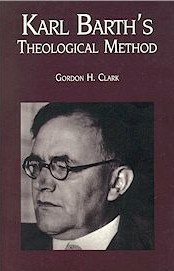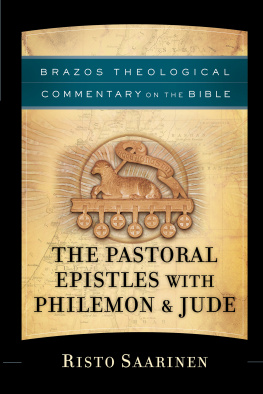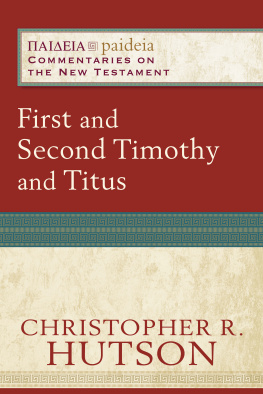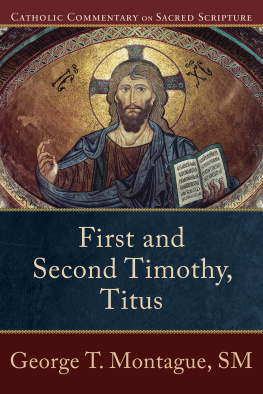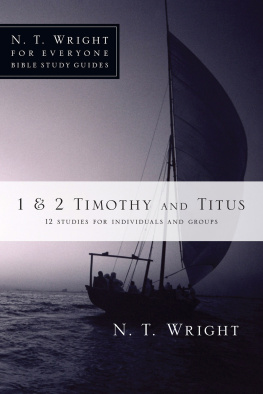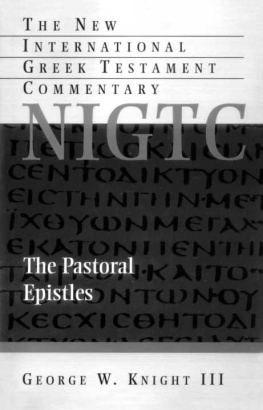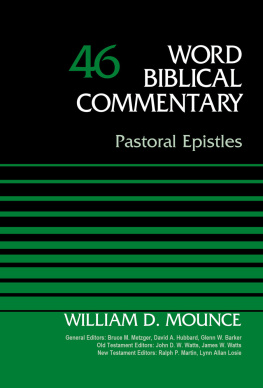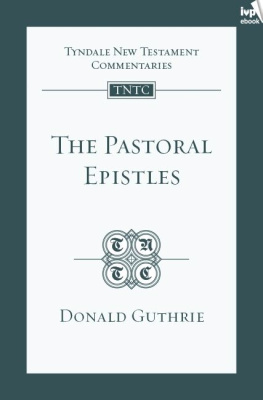Gordon H. Clark - The Pastoral Epistles
Here you can read online Gordon H. Clark - The Pastoral Epistles full text of the book (entire story) in english for free. Download pdf and epub, get meaning, cover and reviews about this ebook. genre: Religion. Description of the work, (preface) as well as reviews are available. Best literature library LitArk.com created for fans of good reading and offers a wide selection of genres:
Romance novel
Science fiction
Adventure
Detective
Science
History
Home and family
Prose
Art
Politics
Computer
Non-fiction
Religion
Business
Children
Humor
Choose a favorite category and find really read worthwhile books. Enjoy immersion in the world of imagination, feel the emotions of the characters or learn something new for yourself, make an fascinating discovery.
- Book:The Pastoral Epistles
- Author:
- Genre:
- Rating:4 / 5
- Favourites:Add to favourites
- Your mark:
- 80
- 1
- 2
- 3
- 4
- 5
The Pastoral Epistles: summary, description and annotation
We offer to read an annotation, description, summary or preface (depends on what the author of the book "The Pastoral Epistles" wrote himself). If you haven't found the necessary information about the book — write in the comments, we will try to find it.
The Pastoral Epistles — read online for free the complete book (whole text) full work
Below is the text of the book, divided by pages. System saving the place of the last page read, allows you to conveniently read the book "The Pastoral Epistles" online for free, without having to search again every time where you left off. Put a bookmark, and you can go to the page where you finished reading at any time.
Font size:
Interval:
Bookmark:
Henry Alford. The Greek Testament. Revised by E. F. Hanson. 4 vols. Chicago: Moody Press.
C. K. Barrett. The Pastoral Epistles. Oxford at the University Press, 1963.
J. A. Bengel. Gnomon of the New Testament. 5 vols. Revised and edited by Andrew R. Fausse. Edinburgh: T. and T. Clark, 1857-1895.
John Henry Bernard. The Pastoral Epistles. Cambridge Greek Testament. Cambridge at the University Press, 1922.
F. Blass and A. DeBrunner. A Greek Grammar of the New Testament, translated and edited by Robert W. Funk. The University of Chicago Press, 1961.
John Calvin. Commentaries on I and II Timothy and Titus. Grand Rapids, Michigan: Baker Book House, 1979.
John Calvin. Institutes of the Christian Religion. Philadelphia: Presbyterian Board of Publication, 1844.
Gordon H. Clark. First John. The Trinity Foundation, 1980.
Gordon H. Clark. Predestination in the Old Testament. Presbyterian and Reformed Publishing Company, 1978.
Hans Conzelman and Martin Dibelius. The Pastoral Epistles. Philadelphia, 1972.
Charles J. Ellicott. The Pastoral Epistles of St. Paul. London: Longmans, Green, Reader and Dyer, 1869.
Patrick Fairbairn. Commentary on the Pastoral Epistles. Grand Rapids, Michigan: Zondervan, 1956.
Patrick Fairbairn. An Exposition of Ezekiel. Grand Rapids, Michigan: Sovereign Grace Publishers, 1960.
John Gill. A Body of Divinity. Grand Rapids, Michigan: Sovereign Grace Publishers, 1971.
John Gill. The Cause of God and Truth. Evansville, Indiana: Sovereign Grace Book Club, 1971.
Donald Guthrie. The Pastoral Epistles. Grand Rapids, Michigan: Wm. B. Eerdmans Publishing Company, 1964.
William Hendriksen. New Testament Commentary: The Pastoral Epistles. Grand Rapids, Michigan: Baker Book House, 1965.
Charles Hodge, Systematic Theology. Grand Rapids, Michigan: Wm. B. Eerdmans Publishing Company, 1970.
John Edward Huther, Meyer's (H. A. W. Meyer) Commentary on the New Testament. 10 vols. Vol. 9. New York: Funk andWagnalls, 1885.
George William Knight III. The Faithful Sayings in the Pastoral Letters. Kampen, 1968.
R. C. H. Lenski. Interpretation of the New Testament. 14 vols. Minneapolis: Augsburg Publishing House, 1946.
Bruce Metzger. A Textual Commentary on the Greek New Testament. London: United Bible Societies, 1971.
William Robertson Nicoll, editor. The Expositor's Greek Testament. 5 vols. Grand Rapids, Michigan: Wm. B. Eerdmans Publishing Company, 1951.
Alfred Plummer. The Pastoral Epistles. The Expositor's Bible. New York: A. C. Armstrong & Son, 1908.
Friedrich Schleiermacher. Uber den Sogenannen Brief von Paulus an den Timotheus. 1807.
Edmund Kidley Simpson. The Pastoral Epistles. London: Tyndale Press, 1954.
Helmut Thelicke. The Evangelical Faith. Grand Rapids, Michigan: Wm. B. Eerdmans Publishing Company, 1974.
John W. Walvoord, editor. Inspiration and Interpretation. Grand Rapids, Michigan: Wm. B. Eerdmans Publishing Company, 1957.
The Works of Gordon Haddon Clark Volume 15
The Trinity Foundation
The Pastoral Epistles Copyright 1983
Lois A. Zeller and Elizabeth Clark George
Second Edition copyright 1998 John W. Robbins
Published by The Trinity Foundation
ISBN: 1-891777-04-1 (hardback) ISBN: 1-891777-05-X (paperback)

1:1,2
Paul, apostle of Christ Jesus, by the command of God our Savior and Christ Jesus our hope, to Timothy, legitimate son by faith: grace, mercy, and peace [from] God the Father and Christ Jesus our Lord.
In the epistle to the Galatians it was necessary for Paul to defend his status as an apostle in the face of pointed opposition. Timothy did not need the spirited defense given in Galatians. Nevertheless Paul mentions, if he does not stress, his apostolic authority to make clear the divine imposition of the following commands. Futhermore, in 2 Thessalonians 3:17, Paul states that his signature is a distinguishing mark in every letter. Of course it is theoretically possible that someone could have forged his signature. But how likely is it, when you today receive a letter from a well-known friend, that the letter is a forgery?
Paul was an apostle by the command of God. Unlike some other places where Paul refers to his being chosen or predestinated to his office, this verse simply indicates that God commanded him to be an apostle. There are no apostles today; but even ministers, though of lesser rank, must be commanded or called. They are stewards of Gods wisdom and grace. Now, no man can appoint himself to the office of steward. Hence, if a young man desires the office, he must seek the divine appointment at the hands of a presbyterial ordination. This matter will become clearer in a later verse.
One may note in passing that God is here called Savior. This title is usually applied to Christ. But here Christ is called our hope. Hope , as other New Testament passages show, does not signify our subjective hoping. Hope designates the thing hoped for. Sub-jectivizing these terms and failing to understand their objective meaning results in misconstruction of the divine message.
Timothy is the addressee. He is called a legitimate son. I do not think that Timothy, at first an illegitimate child, became legitimate by his faith. One might indeed say that before Timothy believed the Gospel, he was not a son at all, and then by believing he was born a son. Here it is perhaps better to use the English preposition in. The sense would be that Timothy was a true or legitimate son in the sphere of faith. The greeting that follows needs no explanation. Its three-fold form, grace, mercy, and peace, rather than the twofold form in Philemon, has no particular significance. There is no reason to suppose that Philemon is a forgery because its form is twofold, nor, what is more frequently the case, to suppose that if Paul were the author of 1 Timothy he could not have used the three-fold form.
As I urged you to remain in Ephesus, when I was leaving for Macedonia, that you might command certain [persons] not to teach heterodox doctrines, nor to pay attention to [or, concern themselves about] myths and endless genealogies, which give rise to [mere] speculation rather than Gods administration in [or, by] faith;
Paul did not furnish us with a literary style worthy of imitation. His sentences are usually grammatical, but they are long and complicated. The present sentence begins with verse 3 and continues to the end of verse 7. In fact, this sentence is not strictly grammatical, unless we mentally supply an obvious apodosis: as I have urged you ... so you urge your people. In the interest of a more English version, translators often break up these lengthy complications into shorter sentences. I shall try to reproduce the original style, and everyone will be glad that ministers in the pulpit will not use it.
The historical situation envisaged here seems to have been Pauls departure from Ephesus to Macedonia. There are a few other historical notes in these epistles. One may try to fit them into the account of Pauls missionary journeys in Acts, but the result will prove unsatisfactory. If the time of the events in Acts is the same time as that of the hints in 1 Timothy, there is not enough detail to fit everything together. One must remember that Acts omits many things Paul did. One must also remember that detective stories depend on the absence of some facts and the non-factual arrangement of others. In the present case it is more likely that the events here given come from a time after the end of Acts.
Font size:
Interval:
Bookmark:
Similar books «The Pastoral Epistles»
Look at similar books to The Pastoral Epistles. We have selected literature similar in name and meaning in the hope of providing readers with more options to find new, interesting, not yet read works.
Discussion, reviews of the book The Pastoral Epistles and just readers' own opinions. Leave your comments, write what you think about the work, its meaning or the main characters. Specify what exactly you liked and what you didn't like, and why you think so.


